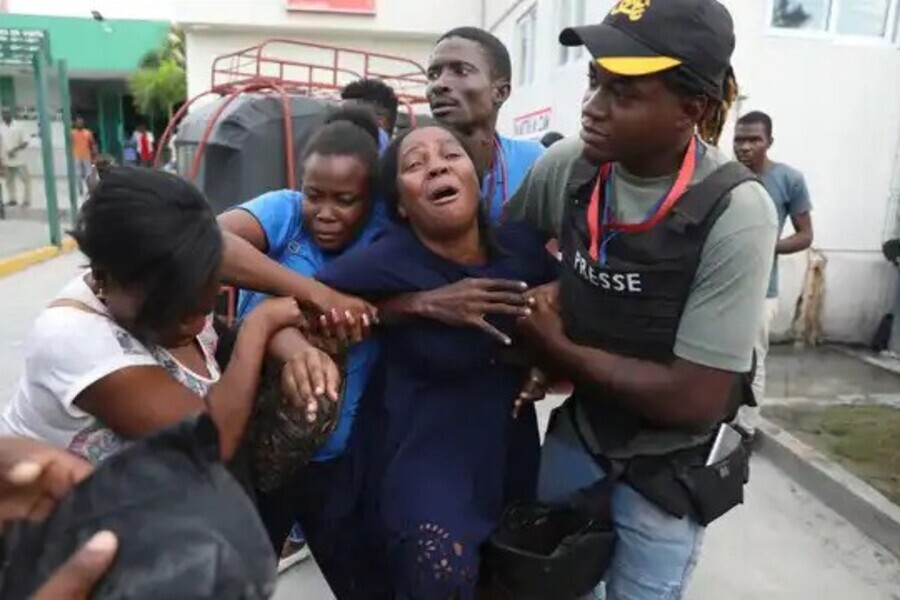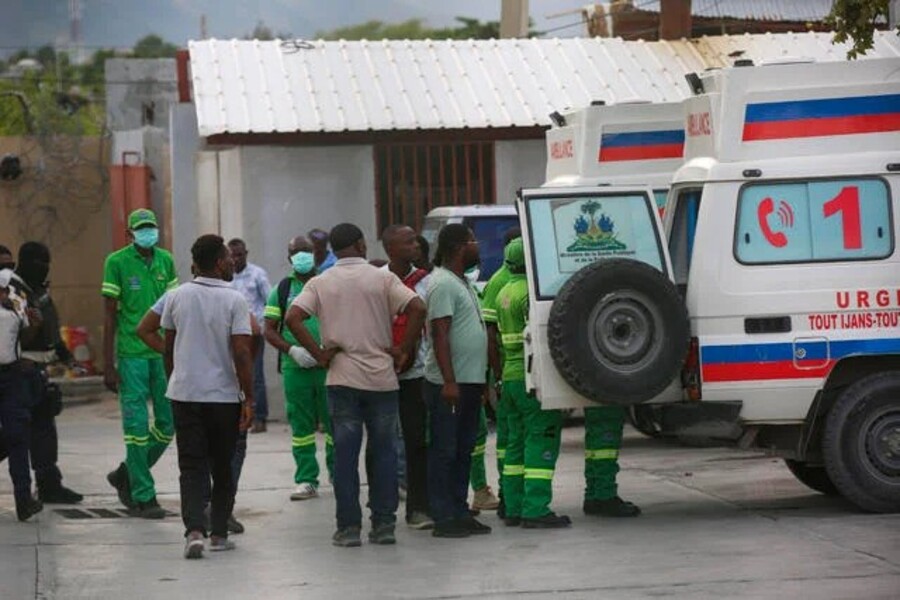In a tragic and senseless attack on Christmas Eve, at least two journalists were killed, and several others wounded when suspected gang members opened fire during the reopening of Port-au-Prince’s General Hospital in Haiti. The attack, believed to be carried out by the notorious Viv Ansanm gang coalition, comes amid escalating violence in the capital, which has been gripped by powerful street gangs controlling an estimated 85% of the city. The violence has severely disrupted life in Haiti, including the healthcare system, leading to the closure of the country’s largest public hospital earlier this year.
On Tuesday, after months of closures due to gang violence, the Haitian government pledged to reopen the General Hospital, a critical facility in the heart of Port-au-Prince. Journalists gathered at the hospital to cover the long-awaited event, only to be caught in a deadly ambush. The attack resulted in the deaths of two reporters, Markenzy Nathoux and Jimmy Jean, both of whom were part of the Haitian media community. Their tragic deaths have sent shockwaves through the nation and the global journalism community, which has already been grappling with increasing threats against press freedom in Haiti.
Robert Dimanche, a spokesperson for Haiti’s Online Media Collective, confirmed the deaths of Nathoux and Jean while also stating that several other journalists were wounded during the gunfire. The group blamed the Viv Ansanm gang coalition for the attack, which appears to have been motivated by the gang’s opposition to the hospital’s reopening. The hospital’s revival was seen as a symbol of state authority reclaiming control from the gangs, who have wreaked havoc in the city for months.
Haiti’s interim president, Leslie Voltaire, addressed the nation following the attack, expressing his condolences to the families of the victims and pledging that the crime would not go unpunished. “I send my sympathies to the people who were victims, the national police, and the journalists,” Voltaire said. He also reiterated that the government would pursue the perpetrators with all available resources, though no specific numbers of casualties or details about the wounded were initially provided. His remarks highlighted the growing sense of urgency in the country as it faces escalating gang violence that has engulfed much of Port-au-Prince.
The attack occurred as journalists filmed inside the hospital, capturing the chaotic and tragic moments as gunfire rang out. Disturbing video footage posted online shows two lifeless bodies, one of which appears to be wearing a press credential around the neck. The victims were identified as Nathoux and Jean, both respected figures in Haitian journalism. Their bodies, bloodied and lifeless, were seen on stretchers, a chilling reminder of the risks faced by journalists working in Haiti amid rising gang violence.

Radio Télé Métronome reported that, in addition to the two confirmed fatalities, several other individuals were wounded in the attack, including both journalists and police officers. According to initial reports, seven journalists and two police officers were injured, though the specifics of their injuries remain unclear. Authorities have yet to release detailed information about the victims, fueling uncertainty and fear within the Haitian press corps, which has long been under siege in a country where gang violence and corruption have stifled the freedom of the press.
The gang violence in Haiti has had a profound impact on the country’s health system. The General Hospital, one of the most important medical institutions in Haiti, was forced to close its doors earlier this year as gangs overtook the surrounding areas. Hospitals and healthcare facilities have been systematically targeted by gangs, who loot medical supplies, set buildings on fire, and create an atmosphere of terror that has driven healthcare workers to abandon their posts.
The hospital’s reopening was seen as a major victory for the Haitian government, a sign that the state might be regaining control of essential services. But the deadly attack during the reopening ceremony shows just how deeply the gangs have infiltrated the city and how difficult it will be to restore order and safety. Despite the reopening of the hospital, Haiti’s healthcare system remains on the brink of collapse, with shortages of medical supplies, overwhelmed facilities, and a surge in patients due to ongoing violence and unrest.
In the wake of the attack, Johnson “Izo” André, a notorious gang leader and one of the most powerful figures in Haiti’s criminal underworld, posted a video on social media claiming responsibility for the attack. André, leader of the Viv Ansanm gang coalition, stated that his group had not authorized the hospital’s reopening and that they would continue to resist any efforts to undermine their control over the city. His video was a chilling reminder of the unchecked power of gangs in Haiti, who have been able to dictate the course of events in the country’s capital.
This latest attack is part of a broader pattern of violence targeting journalists in Haiti. In 2023 alone, two other local journalists were killed, underscoring the perilous conditions faced by the media in a country where press freedom is under constant threat. Radio reporter Dumesky Kersaint was shot and killed in April, followed shortly after by the death of journalist Ricot Jean, whose body was found under mysterious circumstances.
As journalists and media workers continue to face grave risks, the country’s health crisis worsens. Haiti’s health system is stretched to its limits, with hospitals targeted and looted by gangs and critical infrastructure destroyed. The impact of this violence is especially dire as the rainy season approaches, raising the risk of water-borne diseases like cholera. UNICEF reports that there have been over 84,000 suspected cases of cholera in the country, a crisis exacerbated by the destruction of healthcare facilities and the lack of clean water.
The reopening of the General Hospital was supposed to bring a sense of hope to a country battered by years of political instability, gang violence, and economic collapse. Instead, it has become the latest symbol of the devastating effects of lawlessness in Haiti. The shooting that took place on Christmas Eve serves as a grim reminder of the immense challenges facing the country as it attempts to rebuild and restore basic services.
As the investigation into the attack continues, authorities are under increasing pressure to bring the perpetrators to justice and restore some semblance of order to the capital. The attack on the journalists is a direct blow to press freedom and a stark reminder of the dangerous environment that reporters must navigate in Haiti.
The violence, compounded by a deteriorating healthcare system and the relentless control of gangs over much of Port-au-Prince, highlights the urgent need for international intervention and support to help Haiti regain stability. As the country moves forward, it is clear that the road to recovery will be long and fraught with challenges. But for now, the families of the victims and the Haitian people mourn the loss of two journalists whose only crime was to do their job and report on an event meant to signal hope for a better future.


